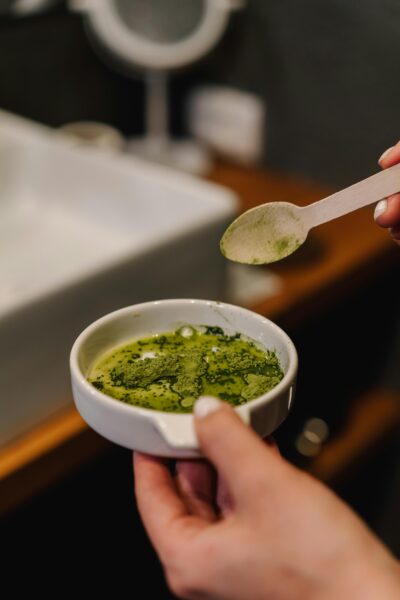
Discover how matcha tea can help prevent breast cancer. Learn about its antioxidants, health benefits, and scientific backing in this in-depth guide.
What is Matcha Tea?
Matcha is a powdered green tea that comes from the same plant as regular green tea, Camellia sinensis. Unlike traditional tea leaves, matcha uses the entire leaf, giving it a rich concentration of nutrients. Its vibrant green color, earthy taste, and high nutritional value make it popular around the world.
Why Matcha Stands Out
Matcha differs from other teas due to its cultivation process. The leaves are grown in the shade, which boosts chlorophyll production, giving it a bright green hue. This method also increases the levels of amino acids and antioxidants. When harvested, the leaves are ground into a fine powder, offering higher nutrient levels than regular tea. These elements contribute to its effectiveness in fighting diseases, including breast cancer.
How Antioxidants Play a Role in Cancer Prevention
One of matcha’s most significant health benefits is its high antioxidant content. Antioxidants are compounds that neutralize harmful free radicals in the body. These free radicals can damage cells and contribute to cancer development. Matcha tea contains a unique type of antioxidant called catechins, which are known for their ability to combat oxidative stress.
- Catechins: The most abundant catechin in matcha is epigallocatechin gallate (EGCG). This compound has shown promise in preventing the growth of cancer cells. EGCG works by reducing inflammation and neutralizing free radicals that can damage DNA and trigger cancer development.
- Chlorophyll: Matcha’s high chlorophyll content not only gives it its signature color but also helps detoxify the body. Chlorophyll can bind to toxins, helping the body remove them before they cause harm. Some studies suggest this could reduce the risk of cancers, including breast cancer.
The Link Between Matcha and Breast Cancer

Studies suggest that matcha tea may play a role in breast cancer prevention. The antioxidants in matcha, particularly EGCG, can inhibit the growth of breast cancer cells. While research is ongoing, early results are promising.
- Apoptosis: Research indicates that EGCG may help trigger apoptosis, a process where cancer cells self-destruct. This is a natural method the body uses to remove damaged cells, preventing them from multiplying and forming tumors.
- Inhibiting Angiogenesis: Angiogenesis is the formation of new blood vessels that tumors need to grow. Matcha has been shown to suppress this process, potentially limiting the development of cancer.
Boosting Immunity with Matcha
A strong immune system is essential in preventing diseases, including breast cancer. Matcha tea contains several compounds that boost immunity, helping the body fight infections and potentially slowing cancer progression.
- L-theanine: Matcha contains an amino acid called L-theanine, known for promoting relaxation and reducing stress. Stress reduction is vital in cancer prevention, as chronic stress weakens the immune system. L-theanine also enhances the production of immune cells, helping the body respond more effectively to threats.
- Polyphenols: Polyphenols, another type of antioxidant in matcha, contribute to immune health by promoting cell repair and protecting against damage caused by free radicals.
Incorporating Matcha Into Your Diet
Drinking matcha tea daily is an easy and enjoyable way to gain its benefits. You can enjoy it in several forms beyond traditional tea:
- Smoothies: Blend matcha with fruits and greens for an antioxidant-packed drink.
- Lattes: A matcha latte with almond or oat milk is a soothing way to consume the tea.
- Baking: Incorporate matcha powder into baked goods like muffins and cakes for a nutritious twist.
Supporting Healthy Hormone Levels
Hormones play a major role in breast cancer
development, particularly estrogen. Excess estrogen can fuel the growth of certain types of breast cancer. Matcha tea has properties that help regulate hormone levels, which can reduce the risk of hormone-related cancers.
- Balancing Estrogen: Research indicates that the antioxidants in matcha may assist in balancing estrogen levels. By reducing estrogen dominance, matcha could lower the risk of cancers that thrive on this hormone, such as certain types of breast cancer.
- Detoxification: Matcha’s chlorophyll content supports the liver, the organ responsible for processing and eliminating excess hormones. A healthy liver is crucial in maintaining balanced hormone levels, potentially reducing breast cancer risk.
Matcha Tea and Weight Management

Maintaining a healthy weight is another way to reduce the risk of breast cancer. Excess body fat, especially around the abdomen, increases the production of estrogen, which can increase the likelihood of developing breast cancer. Matcha tea is known for its ability to boost metabolism and assist in weight management.
- Boosting Metabolism: Matcha contains compounds that enhance fat oxidation and improve metabolic rates. Drinking matcha tea before exercise has been shown to increase the rate at which the body burns calories, which can aid in weight loss.
- Reducing Fat Storage: Regular consumption of matcha tea may help reduce body fat by improving the body’s ability to metabolize lipids. This can lead to lower levels of body fat, which is linked to a reduced risk of breast cancer.
Stress and Cancer Risk
Chronic stress weakens the immune system and can increase the risk of cancer. Drinking matcha tea is an excellent way to manage stress, thanks to its L-theanine content.
- Promoting Relaxation: L-theanine promotes calmness without causing drowsiness. It helps to lower cortisol levels, a stress hormone linked to weight gain and increased cancer risk.
- Mental Clarity: Matcha tea can enhance focus and concentration while keeping stress levels low. This balance of relaxation and alertness is beneficial for overall well-being and cancer prevention.
Matcha as a Preventative Measure
While drinking matcha tea alone cannot guarantee breast cancer prevention, it can be part of a broader lifestyle approach to reduce risk. A diet rich in antioxidants, coupled with regular exercise and stress management, creates a strong foundation for health.
- Pair with a Healthy Diet: Matcha’s benefits are enhanced when paired with a nutrient-rich diet. Focus on whole foods, including fruits, vegetables, lean proteins, and healthy fats. These foods provide the necessary vitamins and minerals that support the body’s defense systems.
- Regular Exercise: Physical activity improves immune function, aids in weight management, and reduces the risk of many cancers. Pairing matcha with exercise can boost fat burning and support overall health.
Drinking Matcha Safely

While matcha offers many benefits, it’s important to consume it mindfully. Due to its high concentration of certain compounds, too much matcha can lead to side effects.
- Caffeine Sensitivity: Matcha contains caffeine, though in smaller amounts than coffee. If you are sensitive to caffeine, limit your intake to one cup per day to avoid side effects like jitters or insomnia.
- Quality Matters: Always opt for high-quality matcha, as lower-quality products may contain contaminants or additives. Look for organic, ceremonial-grade matcha to ensure the best results.

